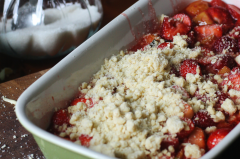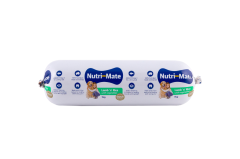It’s that time of year again, folks; it’s time to swap the shorts and swimmers for floppy jumpers and cuddly scarves. While orange leaves and bare branches signify the noticeable external changes in autumn, our internal shifts can be a bit more subtle. If you want to know how the change of season affects you and what you can do about it, plus get a neat little seasonal eating guide for autumn and my favourite Rhubarb Crumble Pies, read on.
The impact of seasonal changes on the body
Immune system
With the new season, unfortunately, come new sniffles. If even the thought of the seasons changing makes your eyes water and nose run, you’re not alone. To reduce your chances of being on the uncomfortable short end of a scratchy throat or common cold, I recommend protecting the gut. As 70 to 80 per cent of the immune system lives in the digestive system, supporting your gut will decrease your chances of experiencing the change of season sniffles.
To help your gut and immune system, sparkle up your routine with a homemade turmeric latte. All you need is half a teaspoon of anti-inflammatory turmeric, some freshly grated ginger and cinnamon; stir this into quarter of a cup of your choice of warmed non-dairy milk, then, once stirred and combined, top with extra milk. You can add some honey to sweeten it too.
Increased weight
Like other mammals, we tend to hibernate in the cooler months. Unfortunately, like mammals, this means most of us add on a bit of a winter coat. An extra layer of fat can appear because our bodies increase their insulin resistance during the seasonal changes. This causes our livers to increase fat production to store fat in our tissues and keep us warm during the cooler months. While this works excellently for animals, most humans don’t appreciate this protective mechanism. The best way to shed or prevent your winter coat is to nourish your body through a healthy diet and regular exercise, so keep this in mind next time you hit the snooze button five days in a row.
Dry skin
If you’ve ever wondered if your skin has been replaced by alligator skin during autumn, this one’s for you! One of the most common responses to autumn is drier skin. You can blame the drop in temperature and humidity for this one. You see, when this drop occurs, the skin has to work harder to maintain hydration. This change can be a bit of a shock to the system, disrupting the normal chemical balance of the skin and causing dryness. To combat dry skin, steer clear of boiling-hot showers, include probiotics or fermented foods, eat healthy fats like salmon and hemp seeds and stay hydrated.
Seasonal eating guide for autumn
Up until this point, I understand it may feel as though autumn is just doom and gloom. But fear not: autumn brings with it a delicious change in in-season produce. Autumn is an excellent time to tune into your desire for warming, restoring and comforting foods.
If you’re wondering why you should eat seasonally, seasonal food is bursting with flavour. It has the highest nutrient value compared to foods stored for longer periods o





